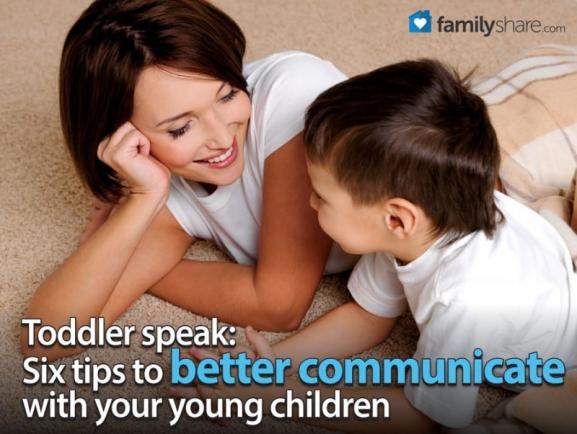
Communication is key in any relationship, especially with those who are most important to you. This probably includes your children, though the irony is that communicating with a toddler is just about the most difficult thing many of us do on a regular basis. Toddlers seem to be constantly speaking a different language (sometimes literally), but a few basic tips can help you and your little one communicate more effectively.
Use simple, straightforward language
When answering questions, explaining what's happening, or setting forth expectations, it's best to err on the side of simplicity. I certainly don't mean you should use "baby talk,"� far from it. But use clear and concise language, skip the idioms, and don't assume that they know who or what you are talking about.
Get down on their level
Whenever possible, look your child in the eye while speaking to him. Kneel, squat or even sit right down on the ground. You'd be surprised how much this improves their confidence and helps you to focus on what he is saying.
Stop and think before speaking
If your child asks a question, stop just a moment and think about your response, even if it's something you easily know the answer to. Compose your thoughts and give a straightforward, age-appropriate response. Too often we start talking before we think and we end up rambling and actually confusing the child more.
Have realistic expectations
Your toddler wants to listen to you, he wants to understand you. But giving him a list of seven things to do is just setting him up for failure. An 18-month-old is capable of understanding three or four sets of instructions at once, but probably not the way you think.
Three or four instructions for an adult looks something like, "I need you to go to the grocery store, get the oil changed on the car, drop the packages at the post office and pick up my dry cleaning."� That's four distinct, separate acts, each one technically comprised of a dozen or more sub-acts.
Three or four instructions to a toddler looks more like, "I need you to go into your bedroom, get your shoes out of your closet, put them on, and then come back to me."� To an adult or even an older child, "put your shoes on"� is a simple request, but toddlers need specific instructions and each step feels like a completely new task to them.
Don't yell
Trust me, we will ALL fail at this. But yelling escalates emotions to no real avail, confusing your little one and wearing you out even faster. The less yelling you do, the better communicator you'll be. Period.
Help him or her be a better communicator
. Communication is a two-way street, and in order to have strong communication with your toddler, the toddler has to be an active and efficient communicator. Of course, no toddler is an efficient communicator, but you can help him or her develop that skill. Lead by example (the first five tips will help there) and give specific instructions when helping your toddler communicate. Consider the following:
"I cannot understand you when you whine. Please take a breath and ask me again."�
"Look at me when you're talking, please. It's hard to understand you when you talk to the floor."�
"Calm down, take a deep breath. Okay, now start again, what happened?"�
Toddlers have a strong set of emotions that they're dealing with, and they need your help to focus those emotions and communicate effectively. A few simple tips for effective communication will make your relationship with your toddler so much sweeter.

